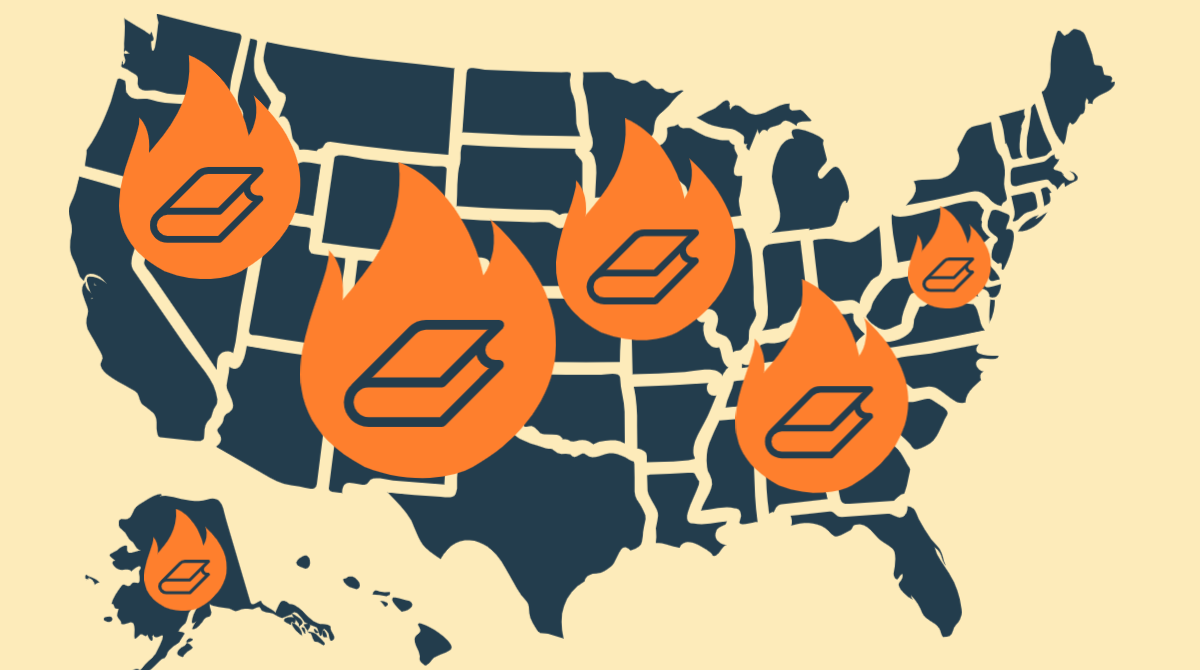Book challenges and bans are increasing in libraries and schools throughout the United States. To help spread the word about these activities and efforts to combat them by librarians, parents, students, politicians, and concerned citizens, I Love Libraries will frequently highlight several stories on the current crisis. This roundup includes news from Florida, Kentucky, Missouri, Oklahoma, and South Carolina.
Handmaid’s Tale, Slaughterhouse-Five: Kansas City-area Schools Now Ban These Books and More
Books dealing with LGBTQ themes have been targeted by conservative parent groups and politicians in Kansas City, Missouri, for months. Now, facing a new state law, some Kansas City schools have removed at least 20 books from library shelves, including Kurt Vonnegut’s Slaughterhouse-Five, the graphic novel Watchmen, and Margaret Atwood’s The Handmaid’s Tale, reports the Kansas City Star. Librarians and other school employees who violate the law could be charged with a misdemeanor, risking up to a year in jail or a $2,000 fine.
Book Ban Disputes Roiling Oklahoma Communities
In communities across Oklahoma, a debate over school library books has intensified, reports Oklahoma Watch. In Stillwater, outrage over certain school library books is dominating school board meetings. In Tulsa, two books were pulled from public school library shelves after a right-wing Twitter account’s post went viral. In Norman, a high school English teacher who posted a link to banned books in her classroom has resigned. And there’s more. A book-challenge situation in Bristow “inspired a state law that goes into effect November 1 requiring school libraries to reflect ‘community standards’ and contain age-appropriate materials.”
More than 100 Books Placed in Restricted Sections in Florida School District
Libraries in Escambia County (Fla.) Public Schools will now have a restricted section containing books that are under appeal for “questionable content,” reports Pensacola News Journal. The new policy was announced after a teacher said that she had read more than 100 books circulating in the district with “inappropriate” content. To access the books in question, students must present a form signed by a parent. The new system will allow students to check out the books while school officials determine whether they can remain in school media centers and classrooms.
Kentucky School District Says LGBTQ Book Banned Elsewhere Has Literary Value, Will Stay
Gender Queer will stay on library shelves in two Louisville, Kentucky high schools, reports the Tri-City Herald. A panel for library challenges in Jefferson County Public Schools decided unanimously on September 26 that Maia Kobabe’s illustrated memoir will remain available to students at Liberty High School and the Phoenix School of Discovery.
“Taken as a whole, Gender Queer is a coming-of-age story of a young person discovering their gender identity,” the panel’s written decision states. Board members reviewed the text and found “that while a few passages contain sexual references or material, the work as a whole is not predominantly appealing to a prurient interest in sexual conduct.” The panel also found that the sexual content in Gender Queer is not “patently offensive” to the average person when “contemporary adult community standards” are applied.
South Carolina Police Called to Library to Investigate “Obscene Material”
A man in Travelers Rest, South Carolina, filed a report with the local police department accusing the Travelers Rest (Sargent) branch of Greenville County Library of committing a crime for spreading obscene material, reports The State. The complainant claimed that LGBTQ books being promoted as part of a Banned Books Week display in the library contained sexually explicit material. The police said they investigated the claim and it was unfounded.
Take action
Alarmed by the escalating attempts to censor books? Here are five steps you can take now to protect the freedom to read.
1. Follow news and social media in your community and state to keep apprised of organizations working to censor library or school materials.2. Show up for library workers at school or library board meetings and speak as a library advocate and community stakeholder who supports a parent’s right to restrict reading materials for their own child but not for all
3. Help provide a safety net for library professionals as they defend intellectual freedom in their communities by giving to the LeRoy C. Merritt Humanitarian Fund.
4. Educate friends, neighbors, and family members about censorship and how it harms communities. Share information from Banned Books Week 2021.
5. Join the Unite Against Book Bans movement to learn what you can do to defend the freedom to read in your community.


